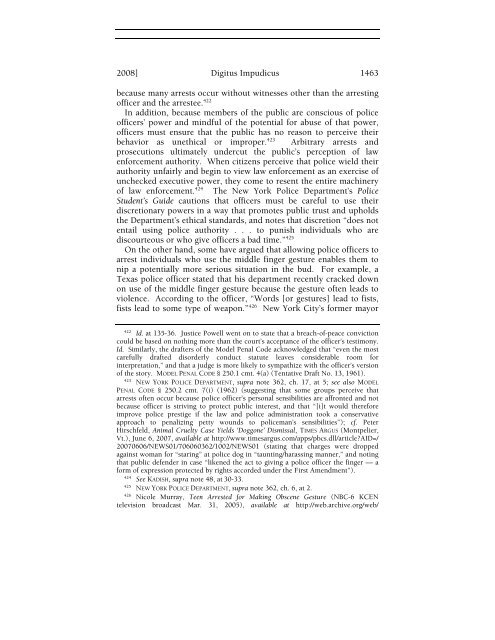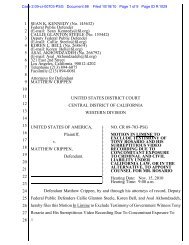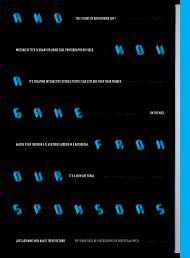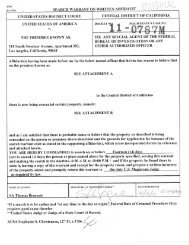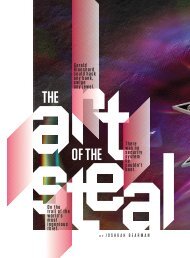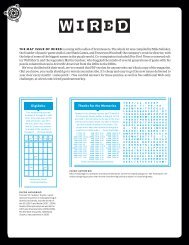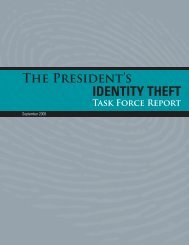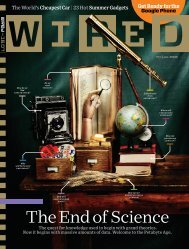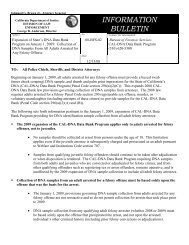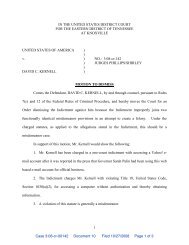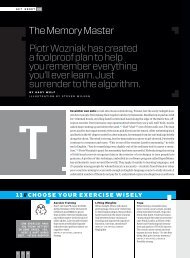Digitus Impudicus: The Middle Finger and the Law - Wired
Digitus Impudicus: The Middle Finger and the Law - Wired
Digitus Impudicus: The Middle Finger and the Law - Wired
Create successful ePaper yourself
Turn your PDF publications into a flip-book with our unique Google optimized e-Paper software.
2008] <strong>Digitus</strong> <strong>Impudicus</strong> 1463<br />
because many arrests occur without witnesses o<strong>the</strong>r than <strong>the</strong> arresting<br />
officer <strong>and</strong> <strong>the</strong> arrestee. 422<br />
In addition, because members of <strong>the</strong> public are conscious of police<br />
officers’ power <strong>and</strong> mindful of <strong>the</strong> potential for abuse of that power,<br />
officers must ensure that <strong>the</strong> public has no reason to perceive <strong>the</strong>ir<br />
behavior as unethical or improper. 423 Arbitrary arrests <strong>and</strong><br />
prosecutions ultimately undercut <strong>the</strong> public’s perception of law<br />
enforcement authority. When citizens perceive that police wield <strong>the</strong>ir<br />
authority unfairly <strong>and</strong> begin to view law enforcement as an exercise of<br />
unchecked executive power, <strong>the</strong>y come to resent <strong>the</strong> entire machinery<br />
of law enforcement. 424 <strong>The</strong> New York Police Department’s Police<br />
Student’s Guide cautions that officers must be careful to use <strong>the</strong>ir<br />
discretionary powers in a way that promotes public trust <strong>and</strong> upholds<br />
<strong>the</strong> Department’s ethical st<strong>and</strong>ards, <strong>and</strong> notes that discretion “does not<br />
entail using police authority . . . to punish individuals who are<br />
discourteous or who give officers a bad time.” 425<br />
On <strong>the</strong> o<strong>the</strong>r h<strong>and</strong>, some have argued that allowing police officers to<br />
arrest individuals who use <strong>the</strong> middle finger gesture enables <strong>the</strong>m to<br />
nip a potentially more serious situation in <strong>the</strong> bud. For example, a<br />
Texas police officer stated that his department recently cracked down<br />
on use of <strong>the</strong> middle finger gesture because <strong>the</strong> gesture often leads to<br />
violence. According to <strong>the</strong> officer, “Words [or gestures] lead to fists,<br />
fists lead to some type of weapon.” 426 New York City’s former mayor<br />
422 Id. at 135-36. Justice Powell went on to state that a breach-of-peace conviction<br />
could be based on nothing more than <strong>the</strong> court’s acceptance of <strong>the</strong> officer’s testimony.<br />
Id. Similarly, <strong>the</strong> drafters of <strong>the</strong> Model Penal Code acknowledged that “even <strong>the</strong> most<br />
carefully drafted disorderly conduct statute leaves considerable room for<br />
interpretation,” <strong>and</strong> that a judge is more likely to sympathize with <strong>the</strong> officer’s version<br />
of <strong>the</strong> story. MODEL PENAL CODE § 250.1 cmt. 4(a) (Tentative Draft No. 13, 1961).<br />
423 NEW YORK POLICE DEPARTMENT, supra note 362, ch. 17, at 5; see also MODEL<br />
PENAL CODE § 250.2 cmt. 7(i) (1962) (suggesting that some groups perceive that<br />
arrests often occur because police officer’s personal sensibilities are affronted <strong>and</strong> not<br />
because officer is striving to protect public interest, <strong>and</strong> that “[i]t would <strong>the</strong>refore<br />
improve police prestige if <strong>the</strong> law <strong>and</strong> police administration took a conservative<br />
approach to penalizing petty wounds to policeman’s sensibilities”); cf. Peter<br />
Hirschfeld, Animal Cruelty Case Yields ‘Doggone’ Dismissal, TIMES ARGUS (Montpelier,<br />
Vt.), June 6, 2007, available at http://www.timesargus.com/apps/pbcs.dll/article?AID=/<br />
20070606/NEWS01/706060362/1002/NEWS01 (stating that charges were dropped<br />
against woman for “staring” at police dog in “taunting/harassing manner,” <strong>and</strong> noting<br />
that public defender in case “likened <strong>the</strong> act to giving a police officer <strong>the</strong> finger — a<br />
form of expression protected by rights accorded under <strong>the</strong> First Amendment”).<br />
424 See KADISH, supra note 48, at 30-33.<br />
425 NEW YORK POLICE DEPARTMENT, supra note 362, ch. 6, at 2.<br />
426 Nicole Murray, Teen Arrested for Making Obscene Gesture (NBC-6 KCEN<br />
television broadcast Mar. 31, 2005), available at http://web.archive.org/web/


